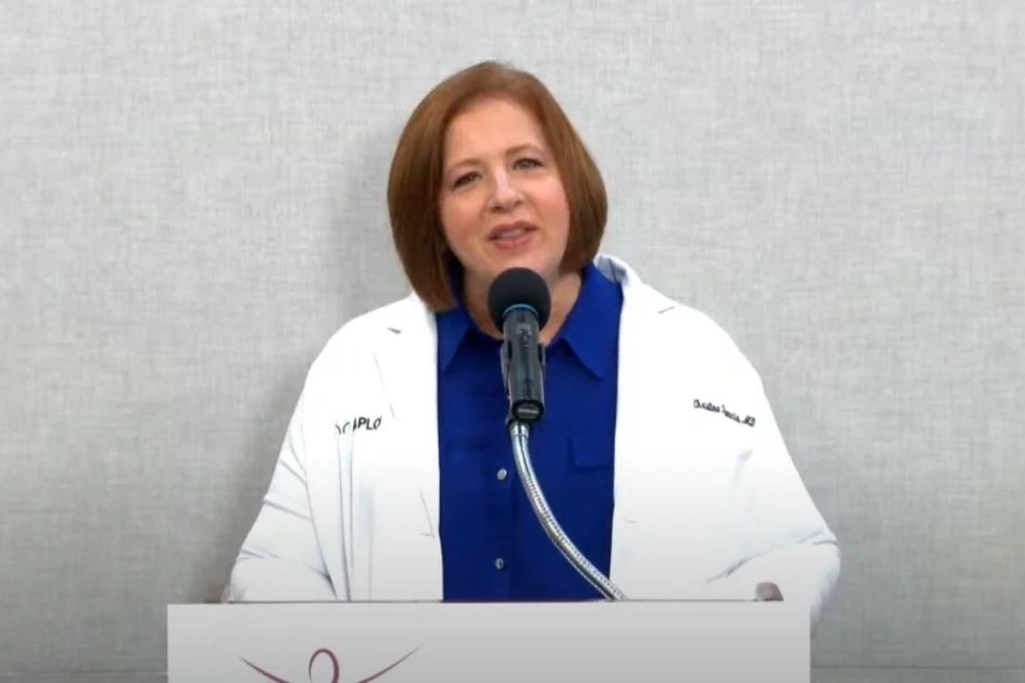
Dr. Christina Francis, CEO of the American Association of Pro-Life Obstetricians and Gynecologists, announced the Women's Healthcare Declaration at a press conference on Tuesday, Oct. 22.
WASHINGTON, D.C. — A coalition of doctors, medical professionals and health care policy leaders are urging dignified care for women and calling for accurate information surrounding pregnancy, pregnancy complications and state laws.
The Women’s Healthcare Declaration urges professional medical organizations, state health agencies, medical boards, hospitals and hospital systems, obstetricians and the Food and Drug Administration to restore the medical standard of care for pregnant women and women facing miscarriage, ectopic pregnancy, an incomplete abortion or other life-threatening conditions related to pregnancy.
“As physicians, we see a dire need to correct the record on induced abortion, abortion laws and life-affirming care,” said Dr. Christina Francis, a board-certified obstetrician and gynecologist, and CEO of the American Association of Pro-Life OBGYNs (AAPLOG). “This declaration offers the facts and clarity that the medical community and lawmakers need, and that our patients — pregnant and preborn — deserve.”
Francis, who has delivered thousands of babies across a two-decade career, said everyone can agree that women and their preborn children deserve the best health care possible and accurate information about their care.
“Elective, induced abortion, which intends the death of a preborn child, does not improve women’s health,” she said at a press conference held Tuesday morning (Oct. 22). “Every state in the country allows physicians like me to intervene immediately to treat miscarriage, ectopic pregnancy, post-abortion complications and other potentially life-threatening complications at any point in pregnancy.”
Dr. Cortney Draper, an emergency room physician, said there is deceptive, inaccurate information about state-level laws that prohibit intentionally causing the death of an unborn child. But she said a permissive approach toward induced abortion does not hinder physicians from treating women facing serious or life-threatening pregnancy complications.
“I have seen the harm to both physicians and patients that results from misinformation and confusion about abortion laws and life-affirming health care,” Draper said. “This declaration offers much-needed clarity on what it means to provide excellent care to pregnant women and their preborn children.”
Last week, Draper treated a woman with a tubal ectopic pregnancy.
“There was no legal question about my ability to appropriately treat her emergency,” Draper said.
Dr. Robin Pierucci, a board-certified neonatologist, also addressed prenatal testing and fetal abnormalities at Tuesday’s press conference.
“Prenatal diagnoses do not adequately describe postnatal prognosis,” Pierucci said. “We do not know until after birth how much or how little any child will be affected by what was diagnosed before they were born.”
Pierucci said the Women’s Healthcare Declaration adds to the discussion surrounding prenatal testing, diagnosis and fetal abnormalities.
“This declaration presents concrete, specific ways to improve pregnant women’s health care and begins the complicated discussion regarding prenatal testing,” Pierucci said. “All of our patients’ lives are inherently valuable, which is why we promise to ‘do no harm;’ this declaration provides a route to uphold our oath.”
Declaration co-signers include the Alliance for Hippocratic Medicine, the American Academy of Medical Ethics, AAPLOG, the American College of Family Medicine and the American College of Pediatricians. Those organizations, and other co-signers, represent over 75,000 physicians and health care professionals.
To learn more about, sign or read the Women’s Healthcare Declaration, visit womenshealthmatters.org.
(EDITOR’S NOTE — This article originally appeared at Kentucky Today. Tessa Redmond is Kentucky Today’s life issues reporter.)


